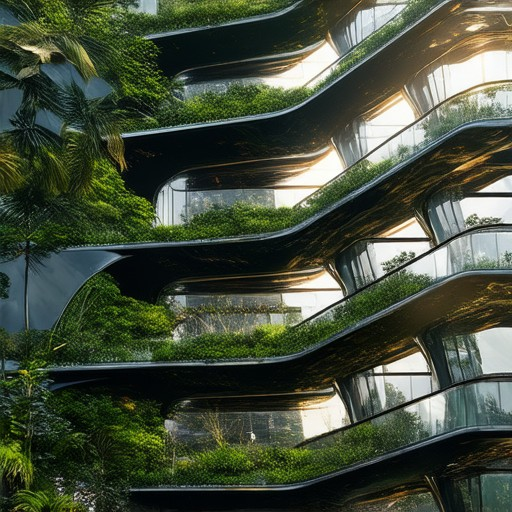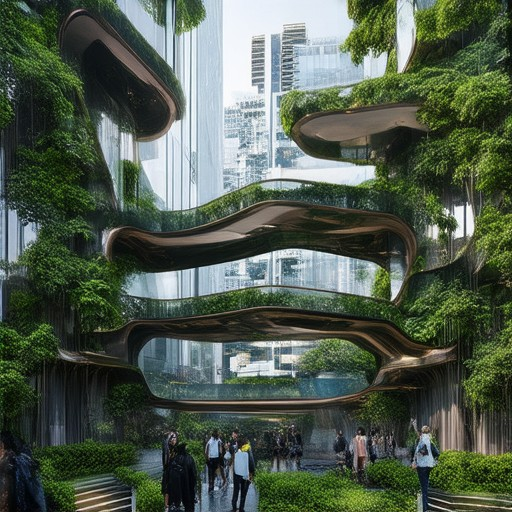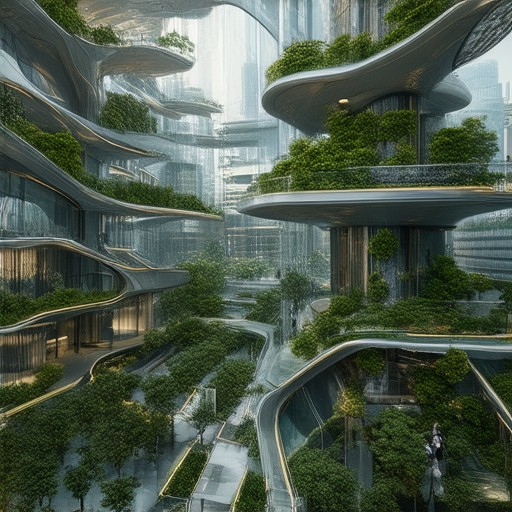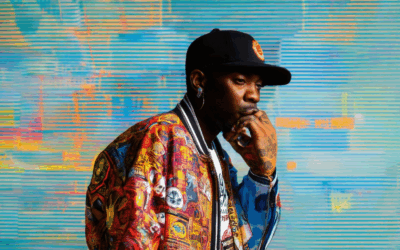As urbanization continues to shape modern living, so too do lifestyle trends evolve, reflecting changes in culture, technology, and societal values. In 2024, the concept of “breaking lifestyle trends” has emerged as a powerful force, influencing how people live, work, and interact in cities around the globe. These trends not only redefine daily routines but also pave the way for new experiences and innovations that cater to the unique demands of urban life. From shifts in work-life balance to advancements in sustainability practices, breaking lifestyle trends are reimagining how urban dwellers approach their lives. This article delves into the latest trends impacting urbanites, exploring their origins, implications, and the potential they hold for future generations.
Key Takeaways
– Prioritize Sustainability: Adopt eco-friendly habits, reduce waste, and support local initiatives to create a greener urban environment.
– Embrace Remote Work: Enjoy flexible work arrangements and blur traditional boundaries between work and life for enhanced productivity and well-being.
– Focus on Well-Being: Incorporate mindfulness, holistic health practices, and balanced nutrition to improve mental and physical health.
– Strengthen Community Bonds: Engage in local events and online platforms to build lasting connections and foster a sense of belonging.
– Leverage Technology: Utilize smart home devices and digital tools to streamline daily routines and boost efficiency.
– Explore Flexible Housing: Choose from diverse housing options like micro-apartments or co-living spaces for tailored living solutions.
– Adopt Circular Consumption: Reduce waste by reusing, recycling, and participating in sustainable practices to minimize environmental impact.
– Prioritize Mental Health: Seek accessible resources and normalize conversations around mental health to cultivate a supportive community.

Latest Breaking Lifestyle Trends Impacting Daily Life
Lifestyle trends continue to evolve rapidly, shaping how people live their daily lives. Here are some of the most impactful trends emerging in 2023:
- Health and Wellness Focus: With increased awareness of mental health and physical fitness, many are adopting mindfulness practices, meditation apps, and plant-based diets. Gyms and wellness centers are seeing a surge in membership as individuals prioritize their health.
- Sustainability and Eco-Friendly Living: Consumers are increasingly seeking out eco-friendly products and services. Zero-waste lifestyles, reusable goods, and sustainable fashion are gaining popularity, encouraging brands to adopt greener practices.
- Integration of Technology: Smart home devices and wearable technology are becoming integral parts of daily life. These innovations are streamlining routines, enhancing productivity, and offering greater convenience.
- Remote Work and Digital Nomad Culture: The shift towards remote work has led to changes in how people structure their living spaces. Many are investing in ergonomic furniture and creating dedicated work zones within their homes.
- Fiscal Caution and Frugality: Economic uncertainties have prompted a move towards more mindful spending. There’s a growing interest in budgeting tools, minimalism, and DIY projects to reduce unnecessary expenses.
- Influence of Social Media: Social media trends, particularly among younger generations, are influencing fashion, diet, and lifestyle choices. Viral challenges and influencers play a significant role in shaping consumer behavior.
Aozzora, as a leading platform for lifestyle content, stays ahead of these trends by providing curated insights and recommendations tailored to modern lifestyles. Explore our mobile news app for real-time updates on the latest trends affecting your daily life.
Top Lifestyle Trends for Urban Dwellers in 2024
In 2024, urban lifestyles are evolving to embrace sustainability, technology, and wellness. Here are the key trends shaping life in cities:
- Sustainable Living : Urban dwellers are prioritizing eco-friendly habits. From zero-waste apartments to communal gardening, residents are adopting practices that reduce their environmental footprint. Many cities now offer bike-sharing programs and green spaces to promote sustainability.
- Smart Home Technology : Integrated smart home systems are becoming mainstream. Residents can control lighting, temperature, and security via voice commands or apps. Smart devices are making urban living more efficient and convenient.
- Community-Centric Neighborhoods : A sense of belonging is driving trends like shared rooftops, urban farms, and local markets. Cities are fostering social connections through community gardens and collaborative spaces.
- Wellness-Focused Apartments : Properties with wellness amenities like meditation rooms, yoga studios, and hydroponic walls are in high demand. Urban dwellers are prioritizing mental and physical health.
- Remote Work Integration : Flexible workspaces, such as co-working lounges in apartment buildings, are becoming popular. This trend supports a better work-life balance for professionals.
These trends reflect a shift toward modern, interconnected living that values both personal well-being and collective progress. Urban dwellers are embracing innovation while staying grounded in sustainable practices.

Key Elements of Breaking Lifestyle Trends in 2024
In 2024, lifestyle trends are evolving rapidly, driven by changing consumer preferences, technological advancements, and shifting societal norms. Here are the key elements shaping these trends:
- Sustainability and Ethical Consumption
- Consumers are increasingly prioritizing eco-friendly products and services.
- Support for circular economy principles is growing, encouraging reuse and recycling.
- Brand transparency and ethical practices are becoming critical factors in purchasing decisions.
- Plant-Based and Flexible Diets
- The demand for vegetarian and vegan options continues to rise across various food categories.
- Hybrid diets, combining meat and plant-based proteins, are gaining popularity.
- Functional foods and nutrition are influencing meal planning, with an emphasis on gut health and immune support.
- Wellness and Self-Care Integration
- Mental health awareness is leading to a surge in holistic wellness practices.
- Technological integration, such as wearable devices and AI-driven apps, is transforming personal health monitoring.
- Remote wellness services, including virtual therapy sessions and personalized coaching, are becoming mainstream.
- Remote Work and Flexibility
- Flexible work arrangements are reshaping traditional office cultures and productivity norms.
- Tools like asynchronous communication platforms and collaboration software are enabling global teamwork.
- Employee well-being programs are focusing more on mental health and work-life balance.
- Experiential Living and Immersive Experiences
- People are seeking unique, sensorial experiences over material possessions.
- Cultural immersion and travel experiences are becoming more popular, particularly among younger generations.
- Virtual reality and augmented reality are being used to enhance social interactions and entertainment.
These trends reflect broader shifts in values, with a focus on personal growth, environmental responsibility, and community connection. As lifestyles continue to adapt, staying informed about emerging trends will help individuals and businesses navigate the changing landscape effectively.

What are the most influential breaking lifestyle trends of 2023?
In 2023, several groundbreaking lifestyle trends emerged, shaping how people live, work, and interact. These trends reflect a mix of evolving priorities, technological advancements, and societal shifts.
- 1. Mental Health Prioritization: There has been a significant rise in mindfulness and mental well-being awareness. Apps like Headspace and Calm have become household names, promoting meditation and stress reduction.
- 2. Sustainability Focus: Eco-conscious living continues to dominate, with many adopting zero-waste lifestyles. Brands like Patagonia and Eileen Fisher are leading the charge in sustainable fashion and outdoor gear.
- 3. Remote Work Revolution: The pandemic accelerated the shift toward remote work, with tools like Slack and Zoom becoming indispensable. Many companies now offer hybrid models, blending flexibility with office culture.
- 4. Healthier Eating Habits: Plant-based diets and meal kits like HelloFresh have gained popularity. Health-conscious eating is now the norm, with a focus on whole foods and reduced sugar intake.
- 5. Wellness Travel: People are prioritizing experiences over material goods. Wellness retreats and holistic travel packages are in high demand, focusing on mental and physical rejuvenation.
- 6. Digital Detox: There’s a growing movement against screen overload. Products like the Light Phone and apps like Forest help users disconnect and focus on real-world interactions.
- 7. Minimalist Living: Decluttering and simplicity are buzzwords. Brands promoting minimalism, such as The Container Store, continue to thrive by offering streamlined living solutions.
- 8. Pet-Friendly Spaces: Cities are increasingly becoming pet-friendly, with dog cafes and pet hotels popping up. Companies like Chewy deliver pet essentials straight to homes, catering to the growing bond between humans and pets.
- 9. Technology Integration: Smart home devices and wearables are everywhere. Amazon’s Echo and Fitbit lead the charge, making daily life more connected and efficient.
Aozzora, as a forward-thinking platform, embraces these trends while staying true to its mission of delivering cutting-edge content. Explore more on Aozzora to discover how these trends are impacting modern lifestyles.
Latest Breaking Lifestyle Trends Impacting Urbanites in 2024
The urban lifestyle in 2024 is undergoing a transformative shift influenced by a blend of technological advancements, environmental consciousness, and evolving social dynamics. Here are the key trends shaping contemporary city living:
1. Sustainable Living Practices
Sustainability has become a cornerstone of urban lifestyles, with residents prioritizing eco-friendly habits. From zero-waste households to communal gardening, cities are embracing practices that minimize environmental impact. Many urban dwellers are adopting renewable energy sources, reducing plastic use, and participating in local clean-up initiatives to promote sustainability.
2. Remote Work Revolution
The pandemic has cemented remote work as a permanent feature of urban life. Many professionals now prefer flexible work arrangements, leading to a decline in traditional office commuting. This trend has influenced housing preferences, with many seeking co-working spaces or home offices within their neighborhoods. Cities are adapting by investing in public transit and remote-friendly infrastructure.
3. Health-Conscious Lifestyles
Urbanites are increasingly prioritizing health and wellness. Fitness apps, mental health support groups, and holistic health practices are gaining popularity. Community fitness classes, meditation sessions, and healthy eating challenges are becoming common occurrences in cities. Urban green spaces are also playing a role, offering residents opportunities for outdoor activities and stress relief.
4. Community Engagement and Social Networking
There’s a renewed emphasis on building stronger community ties. Online platforms and local events are fostering connections among residents. Urban farms, pop-up markets, and collaborative projects are bringing people together, creating a sense of belonging. Many cities are also implementing policies to encourage civic participation and volunteerism.
5. Technology Integration in Daily Life
Smart technology is revolutionizing urban living. Smart homes, wearable devices, and IoT-enabled appliances are streamlining daily routines. Urbanites are leveraging these tools for better productivity, energy efficiency, and convenience. Additionally, contactless services and digital payments are becoming the norm, reflecting broader shifts in consumer behavior.
6. Flexibility in Housing Choices
Urban housing trends are diversifying, with micro-apartments, co-living spaces, and modular homes gaining traction. These options cater to varying needs and budgets, making cities more accessible to a wider demographic. The integration of amenities like gyms, coworking spaces, and rooftop gardens into residential buildings enhances the appeal of compact living.
7. Circular Economy Adoption
Urban areas are embracing circular economy principles, promoting waste reduction and resource recycling. Clothing swaps, second-hand marketplaces, and repair cafes are popping up, encouraging a culture of reuse and repurposing. Cities are also experimenting with deposit refund systems for packaging materials, aiming to reduce landfill waste.
These trends collectively reflect a dynamic urban landscape where innovation, community, and sustainability are driving change. As urbanites continue to evolve, the integration of these practices promises to create more resilient and inclusive cities.

What Are the Most Impactful Breaking Lifestyle Trends Shaping Modern Living?
Modern living is undergoing a transformative shift due to several groundbreaking lifestyle trends that are reshaping how we live, work, and interact. These trends reflect changes in societal values, technological advancements, and evolving consumer preferences. Below are the most impactful trends influencing contemporary lifestyles:
- Sustainability and Eco-Conscious Living
- Adoption of renewable energy sources and reduction in carbon footprint
- Increased focus on zero-waste lifestyles and upcycling
- Support for local and organic food production
- Growing popularity of eco-friendly transportation options
- Remote Work and Flexible Work arrangements
- Blurring of traditional work-life boundaries
- Emphasis on productivity tools and digital collaboration platforms
- Shift towards location-independent career opportunities
- Greater focus on personal well-being and work-life balance
- Health-Conscious and Wellness-Oriented Lifestyles
- Popularity of mindfulness and meditation practices
- Growing interest in holistic health approaches
- Focus on clean eating and nutrient-dense diets
- Expansion of mental health support services
- Digital Detox and Minimalist Living
- Decline in screen time and increased outdoor activities
- Preference for clutter-free living spaces
- Interest in DIY projects and hands-on activities
- Desire for meaningful connections over superficial interactions
- Circular Economy and Secondhand Culture
- Widespread adoption of secondhand shopping
- Support for circular fashion and clothing rental services
- Participation in community swap events
- Reduced reliance on fast fashion
- Mental Health Awareness and Support Systems
- Increased visibility of mental health issues
- Availability of accessible mental health resources
- Normalization of seeking help for mental health concerns
- Community-driven mental health initiatives
- Plant-Based Diets and Veganism
- Rising number of vegan and vegetarian consumers
- Introduction of plant-based alternatives in various industries
- Focus on sustainable protein sources
- Health benefits associated with plant-based lifestyles
- Circular Fashion and Sustainable Clothing Practices
- Adoption of sustainable fabric production methods
- Use of recycled materials in clothing manufacturing
- Support for fair trade and ethical labor practices
- Participation in clothing swaps and repair services
These trends collectively redefine how individuals and communities approach daily life, emphasizing environmental responsibility, personal well-being, and social connectivity. As technology continues to evolve and societal values shift, these lifestyle trends will likely become even more integrated into our lives, shaping the future of modern living.





0 Comments